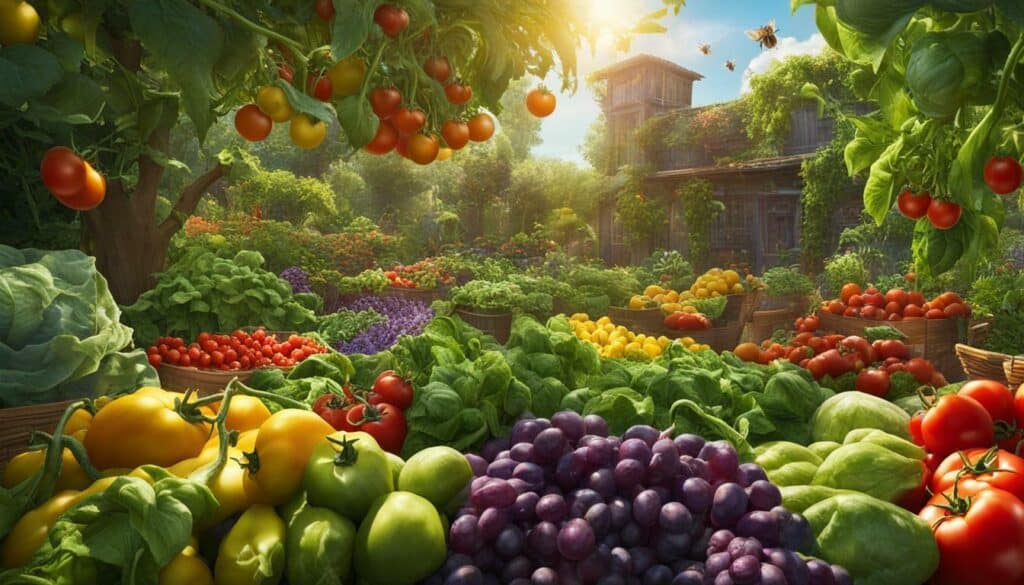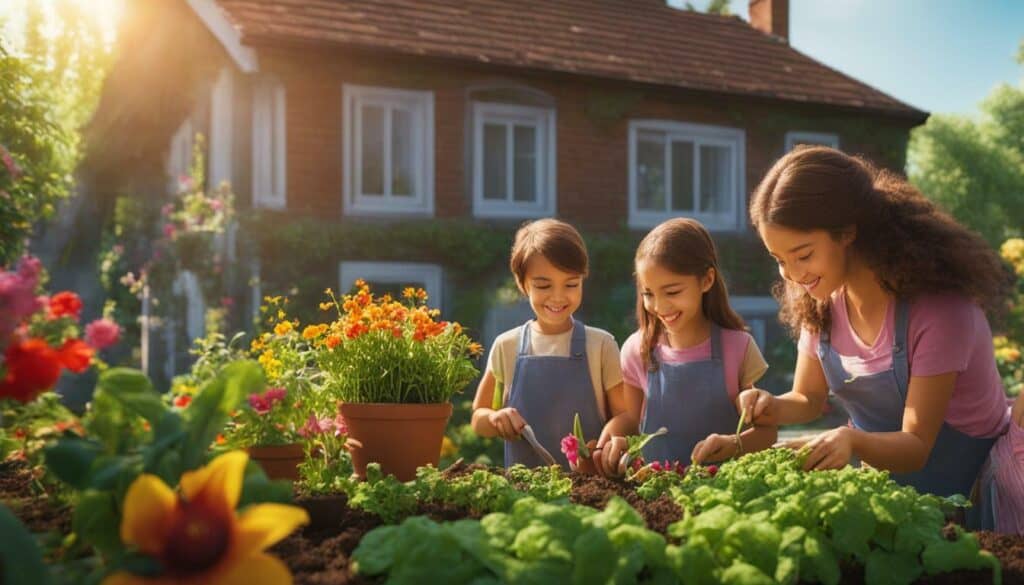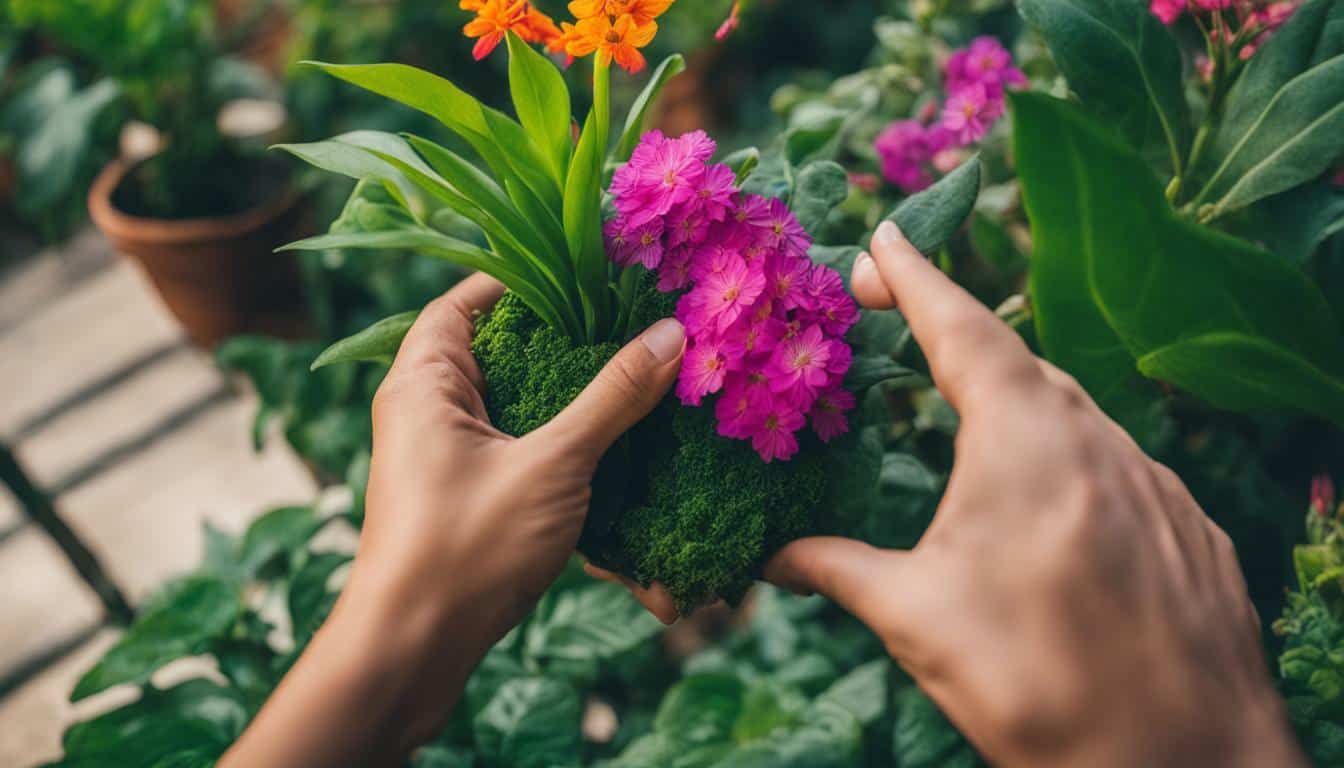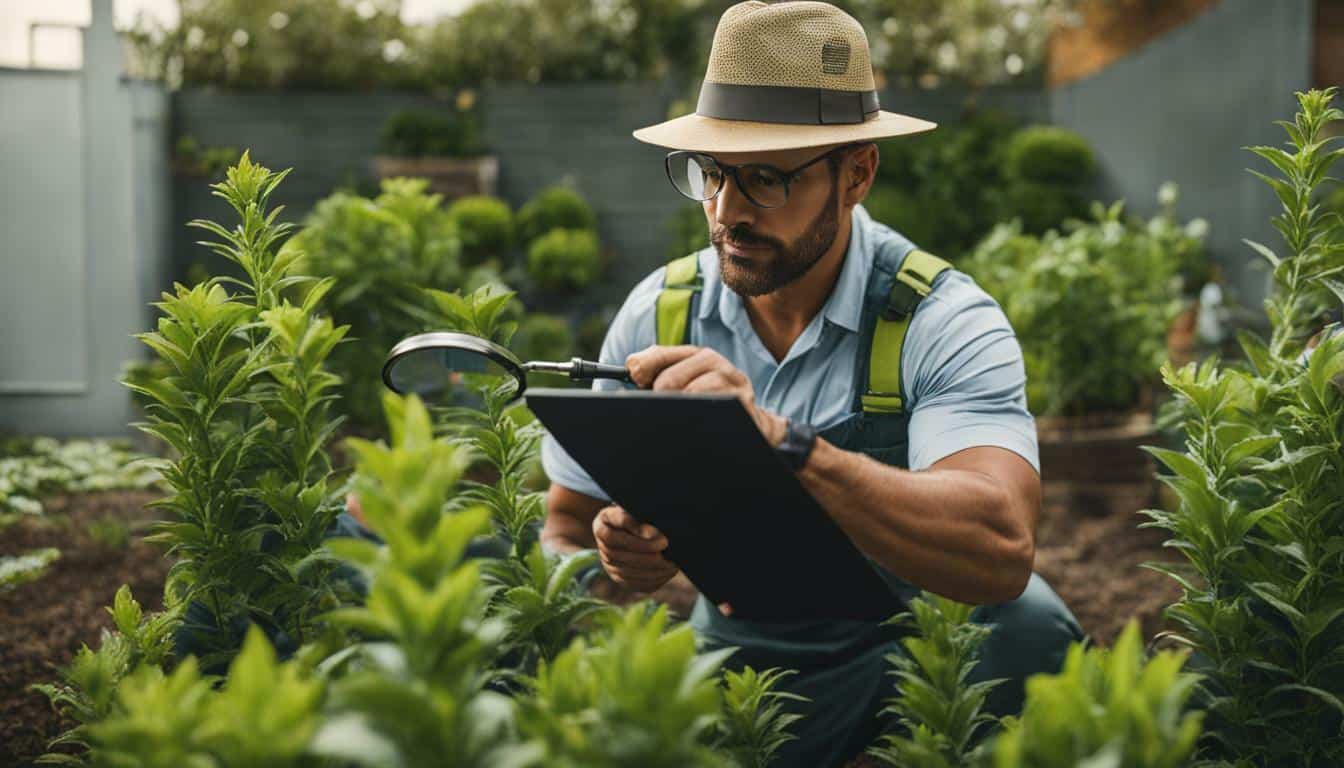Planting a garden is not just a task, but a transformative experience that nurtures life and cultivates joy. It is an opportunity to connect with nature, create beauty, and find solace in the wonders of the natural world. Whether you have a spacious backyard or a small balcony, tending to plants can bring a sense of fulfillment and happiness.
Key Takeaways:
- Gardening supports wellness by providing a healthy hobby and promoting physical exercise.
- Gardening improves home environments by cleaning the air and enhancing property value.
- Gardening fosters family bonding through shared experiences and teaches children valuable lessons.
- Gardening offers a therapeutic escape from everyday stress and promotes personal growth.
- Gardening evokes a sense of wonder, creativity, and purpose, bringing joy and contentment.
Gardening Tips for Beginners
If you’re new to gardening, don’t worry! Follow these simple tips, and you’ll be well on your way to creating a thriving garden of your own.
- Start small: Begin with a small area or a few pots to manage. This will allow you to learn and experiment without feeling overwhelmed.
- Choose the right location: Ensure your plants get enough sunlight throughout the day. Most vegetables and flowers require at least 6 hours of direct sunlight.
- Prepare the soil: Good soil is essential for healthy plant growth. Remove any weeds, rocks, or debris from the area and add compost or organic matter to improve the soil’s fertility.
- Select the right plants: Consider the climate, available space, and your personal preferences when choosing what to grow. Start with easy-to-grow plants like tomatoes, herbs, or marigolds.
- Water wisely: Proper watering is key to plant success. Water deeply and less frequently to encourage deep root growth, and avoid overhead watering to prevent diseases.
- Protect your plants: Use organic pest control methods like companion planting or organic sprays to ward off pests and diseases. Regularly inspect your plants for any signs of trouble.
- Maintain regularly: Check your garden regularly for weeds, prune dead branches, and remove spent flowers to encourage new growth. This will keep your garden healthy and tidy.
“Gardening is the art that uses flowers and plants as paint, and the soil and sky as canvas.” – Elizabeth Murray
Gardening is a journey of discovery and creativity. Don’t be afraid to make mistakes and learn from them. With patience, dedication, and these beginner tips, your garden will flourish, bringing you endless joy and fulfillment.
Quick Planting Guide
| Plant | Best Time to Plant | Spacing | Watering |
|---|---|---|---|
| Tomatoes | After the last frost | 24-36 inches apart | Regularly, deep watering |
| Basil | After the danger of frost | 8-12 inches apart | Regularly, keep soil moist |
| Zinnias | Spring, after the last frost | 6-12 inches apart | Regularly, allow soil to dry slightly between waterings |
| Lettuce | Cool seasons, early spring or fall | 6-12 inches apart | Regularly, keep soil consistently moist |
Remember, gardening is a wonderful way to connect with nature, nurture life, and cultivate joy. So roll up your sleeves, get your hands dirty, and let the beauty of your garden unfold.
Creating a Beautiful Flower Garden
A flower garden is like a living painting, and with careful planning and design, you can create a beautiful masterpiece right in your own backyard. Whether you have a small plot or a vast expanse of land, there are endless possibilities to transform your outdoor space into a vibrant and enchanting sanctuary. By combining the right flowers, colors, and textures, you can create a garden that captivates the senses and provides year-round beauty.
When designing your flower garden, it’s important to consider a few key factors. Start by assessing the sunlight and shade patterns in your yard to determine which areas are suitable for different types of plants. Some flowers thrive in full sun, while others prefer partial shade. This will help you choose the right plants and arrange them accordingly for optimal growth.
Next, think about the overall layout and structure of your garden. Consider using different heights and layers to create depth and visual interest. Grouping flowers of similar colors or complementary shades can create a cohesive and harmonious look. You can also incorporate hardscaping elements, such as pathways, trellises, or decorative borders, to add structure and define different areas within your garden.
Lastly, don’t forget to think about seasonal interest and continuous bloom. By selecting a variety of flowers that bloom at different times throughout the year, you can ensure that your garden remains vibrant and colorful from early spring to late fall. This will provide a ever-changing display of beauty that will astonish both you and your visitors.

Table: Flower Varieties for Different Seasons
| Season | Flower Varieties |
|---|---|
| Spring | Tulips, daffodils, hyacinths |
| Summer | Roses, sunflowers, dahlias, zinnias |
| Fall | Mums, asters, pansies |
With careful planning and attention to detail, a beautiful flower garden can become a haven of tranquility and a source of endless inspiration. The combination of colors, scents, and textures will not only enhance the beauty of your outdoor space but also evoke a sense of serenity and joy. So, roll up your sleeves and get ready to create a garden that will be the envy of the neighborhood.
Growing Your Own Vegetable Garden
There’s nothing quite like the taste of homegrown vegetables, and with your own vegetable garden, you can enjoy the rewards of your labor while supporting a sustainable food system. Organic gardening, in particular, allows you to grow nutritious, chemical-free produce right in your backyard. Not only does it benefit your health, but it’s also an environmentally friendly choice.
When starting your vegetable garden, it’s essential to choose the right location. Vegetables need at least six hours of direct sunlight per day, so find a spot in your yard that receives ample sunlight. Prepare the soil by removing any weeds, rocks, or debris. Adding compost or organic matter will help improve soil fertility and drainage.
Next, decide which vegetables you want to grow. Consider your climate and the length of your growing season when selecting the plants. Some popular choices for beginners include tomatoes, peppers, lettuce, carrots, and herbs like basil and parsley. Plan your garden layout accordingly, giving each plant enough space to grow and ensuring proper airflow.
| Vegetable | Planting Time | Harvest Time |
|---|---|---|
| Tomatoes | Spring | Summer |
| Peppers | Spring | Summer/Fall |
| Lettuce | Spring/Fall | Spring/Fall |
| Carrots | Spring/Fall | Summer/Fall |
| Herbs | Spring/Fall | Ongoing |
Regular watering, proper pest management, and weeding are crucial for the success of your vegetable garden. It’s important to monitor the moisture levels and provide adequate water, especially during hot and dry periods. Mulching can help retain moisture and suppress weed growth. Use organic methods to control pests, such as handpicking, companion planting, or natural pest repellents.
With a little patience and care, your vegetables will thrive, and soon you’ll be enjoying the flavors of your own harvest. Remember, gardening is a continuous learning process, and each season brings new opportunities for growth. So roll up your sleeves, get your hands dirty, and experience the joy of growing your own vegetable garden!
Quote of Inspiration:
“The greatest fine art of the future will be the making of a comfortable living from a small piece of land.” – Abraham Lincoln

Disclaimer: The information provided in this article is for educational purposes only and does not constitute professional advice. Consult with a gardening expert or agricultural extension service in your area for specific guidance tailored to your unique gardening needs. Happy gardening!
Essential Garden Maintenance
Like any living thing, a garden requires care and attention. Learn how to effectively maintain your garden and keep it flourishing year after year.
One of the key aspects of garden maintenance is regular watering. Different plants have varying water requirements, so it’s important to understand the needs of your specific garden. A good rule of thumb is to water deeply and less frequently, allowing the water to reach the roots. Consider using a soaker hose or drip irrigation system to ensure efficient water distribution and prevent overwatering.
Another crucial aspect of garden maintenance is proper pruning. Pruning helps maintain the shape and health of plants, promotes new growth, and prevents the spread of diseases. Remove dead or damaged branches, and prune to control the size and shape of the plant. Remember to use clean, sharp tools and prune during the appropriate season, as different plants have different pruning requirements.
Weeding is an ongoing task in garden maintenance. Weeds compete with your plants for nutrients, light, and space, so it’s important to keep them under control. Regularly inspect your garden for weeds and remove them by hand or use a natural weed killer. Applying mulch around your plants can also help suppress weed growth and conserve moisture.
To ensure your garden thrives, it’s essential to provide adequate nutrition. Fertilizers are a great way to supplement the nutrients in your soil. Choose a fertilizer that suits the needs of your plants, whether it’s a slow-release granular fertilizer or an organic option. Remember to follow the instructions on the packaging and avoid over-fertilizing, as it can harm your plants.
By following these essential garden maintenance practices, you’ll create a healthy and beautiful garden that brings joy and fulfillment year after year. Remember to enjoy the process and take pride in the progress your garden makes. Gardening is not only about the end result but also about the journey of nurturing life and cultivating joy.
| Maintenance Tasks | Frequency |
|---|---|
| Watering | Varies by plant, generally 1-2 times per week |
| Pruning | As needed throughout the year |
| Weeding | Regularly, as weeds appear |
| Fertilizing | Once every 4-6 weeks during the growing season |
The Wellness Benefits of Gardening
Gardening is not only good for your plants; it’s good for you too! Discover the many wellness benefits that come with spending time in the garden.
When you engage in gardening, you are not only tending to your outdoor space, but you are also nurturing your own well-being. Spending time outside in the garden allows you to connect with nature and reap the physical, mental, and emotional rewards. Gardening has been proven to be a therapeutic activity that reduces stress, promotes relaxation, and enhances overall happiness. It provides a peaceful escape from the hustle and bustle of daily life, allowing you to immerse yourself in the beauty and tranquility of nature.
Not only does gardening offer a sense of calm, but it also provides an opportunity for physical exercise. Digging, planting, weeding, and watering all contribute to a low-impact workout that improves strength, flexibility, and cardiovascular health. Gardening also allows you to soak up the sun and absorb vitamin D, which can strengthen your immune system and support bone health. So put on your gardening gloves, grab your tools, and get ready to cultivate both your garden and your well-being.

In addition to the physical benefits, gardening is known to have positive effects on mental and emotional well-being. It has been shown to reduce symptoms of anxiety and depression, improve mood, and boost self-esteem. The act of nurturing plants and seeing them thrive can instill a sense of purpose and accomplishment. Gardening also encourages mindfulness and presence, allowing you to be fully engaged in the present moment as you tend to your plants. Whether it’s the act of planting seeds, watching flowers bloom, or harvesting vegetables, each step along the gardening journey brings a sense of joy and fulfillment.
So if you’re looking for a natural way to enhance your overall well-being, look no further than your own backyard. Gardening offers a multitude of benefits, from physical fitness to mental rejuvenation. It provides an opportunity to reconnect with nature, create a beautiful space, and find solace in the wonders of the natural world. So grab your gardening gloves, step outside, and let the healing power of gardening nurture your body, mind, and soul.
Gardening as a Family Bonding Activity
Gardening is a wonderful activity that brings families closer together, fostering love, connection, and a shared appreciation for nature’s wonders. When parents and children work together in the garden, they not only cultivate beautiful plants but also nurture strong bonds and create lasting memories.
“In every gardener, there is a child who loves to play in the dirt,” said gardening enthusiast and author Allan Armitage. And what better way to tap into that inner child than by involving the whole family in the gardening process? From digging in the soil and planting seeds to caring for the growing plants, each family member can contribute their unique skills and talents, creating a sense of teamwork and accomplishment.
As parents, we have the opportunity to pass on our knowledge and love for nature to our children. Gardening teaches kids valuable life lessons, such as responsibility, patience, and the importance of nurturing and caring for living things. They learn about the cycles of life, the magic of growth, and the rewards of hard work. Plus, it’s a chance to explore the wonders of the natural world and discover the incredible diversity of plants and creatures that inhabit our garden.
| Gardening Benefits for Families |
|---|
| 1. Quality time spent together outdoors |
| 2. Learning valuable life skills |
| 3. Creating a sense of responsibility and connection to the environment |
But gardening is not just about the educational and practical aspects. It’s also about creating cherished family moments. Picture this – laughter filling the air as you water the plants together, little hands covered in dirt, and the excitement of discovering the first sprouts breaking through the soil. These simple pleasures strengthen the family bond and become cherished memories that will be treasured for years to come.
So, gather your family, grab your gardening tools, and let nature be your guide. Whether you have a small patio or a sprawling yard, there are endless possibilities to explore. Embrace the joy, beauty, and togetherness that gardening brings, and watch as your family grows, not only in the garden but also in love and connection.

The Magic and Joy of Gardening
Gardening goes beyond soil and plants; it touches our souls and fills our hearts with pure magic and unadulterated joy. There is something truly enchanting about tending to a garden, witnessing the miracles of nature unfold before our eyes. It is a harmonious dance between human hands and the earth, a co-creation that brings immeasurable happiness.
When we immerse ourselves in the world of gardening, we experience a deep sense of peace and connection. Surrounded by vibrant blooms and lush greenery, we find solace from the chaotic pace of everyday life. The act of tending to plants becomes a form of meditation, a moment of mindfulness where we can slow down, breathe, and appreciate the beauty that surrounds us.
“In every gardener, there is a true artist longing to bring beauty into the world. Through gardening, we become the painters, sculptors, and poets who weave together colors, shapes, and scents.”
Gardening is an art form that allows us to express our creativity. Whether it’s designing a breathtaking flower bed or experimenting with unique plant combinations, we have the opportunity to transform our outdoor space into a masterpiece. Each flower and leaf becomes a stroke of paint on the canvas of our garden, creating a living tapestry that delights the senses.
As we nurture our plants, we not only cultivate beauty but also create a sanctuary for wildlife. Our gardens become havens for bees, butterflies, and birds, contributing to the delicate balance of our ecosystem. It is a joyful sight to see these pollinators flitting from flower to flower, a reminder of the interconnectedness of all living beings.

The Healing Power of Nature
Gardening has a profound impact on our well-being, both physically and emotionally. Studies have shown that spending time in nature reduces stress levels, boosts mood, and improves overall mental health. The rhythmic act of digging, planting, and caring for plants can be therapeutic, providing a sense of purpose and accomplishment.
Moreover, gardening offers us the opportunity to grow our own nourishing food. There is a special joy in savoring the taste of freshly harvested vegetables or plucking juicy fruits from our own backyard. It connects us to the earth’s abundance and reminds us of the miracles of nature that sustain us.
The magic and joy of gardening are undeniable. It is a journey of growth and transformation, a dance with nature that nourishes our bodies, minds, and souls. So, let us embrace the wonders of gardening and let our hearts blossom along with our gardens.
| Benefits of Gardening | Summary |
|---|---|
| Supports wellness | Gardening promotes physical health, reduces stress, and improves memory. |
| Improves home | Plants clean the air, improve soil health, and increase property value. |
| Fosters family bonding | Gardening together creates shared experiences and teaches valuable lessons. |
Conclusion
Planting a garden is more than just a hobby; it’s a life-enriching journey that nourishes our surroundings, our bodies, and our souls.
Gardening offers a multitude of benefits, supporting our overall wellness in various ways. By connecting us with nature, it provides a healthy hobby that encourages us to spend time outside and absorb essential vitamin D. Not only does this strengthen our immune system and reduce the risk of diseases, but it also serves as a form of exercise, helping build strength, promote better sleep, and maintain a healthy weight. Additionally, studies have shown that gardening can reduce stress, improve memory, and even be a potential treatment for dementia, highlighting its positive impact on our mental and emotional well-being.
Aside from its wellness benefits, gardening also contributes to home improvement and environmental conservation. Through the release of oxygen and absorption of carbon dioxide, plants clean the air and promote a healthier environment. Their roots improve soil health and prevent erosion, while landscaping adds value to our properties and creates vibrant ecosystems that attract beneficial pollinators. By engaging in gardening, we actively participate in creating a better world for ourselves and future generations.
Furthermore, gardening serves as a powerful tool for family bonding. It provides opportunities for shared experiences and tasks, fostering a stronger sense of connection among family members. Gardening with children, in particular, offers valuable lessons about nature, responsibility, and the joy of growing their own food. These shared moments in the garden create lasting memories and strengthen family relationships, all while nurturing a love and appreciation for the natural world.
In conclusion, gardening brings immeasurable happiness and inspiration to our lives. It offers a sense of peace, allows for creativity, and connects us with the miracles of nature. Nurturing a garden serves as a therapeutic activity, providing an escape from everyday stress and an avenue for personal growth. It encourages us to develop a stronger bond with the environment, practice mindfulness and patience, and experience a sense of accomplishment as we witness plants grow and bloom. Gardening is, indeed, a source of pure magic and profound joy that evokes nostalgia and ignites a sense of purpose and contentment within us.
How Does Gardening Contribute to a Healthy Lifestyle?
Discover the joy of gardening and experience its numerous benefits for a healthy lifestyle. Engaging in gardening activities helps reduce stress, improve mental well-being, and enhance physical health. Spending time outdoors, nurturing plants, and being surrounded by nature can boost your mood, increase Vitamin D levels, and encourage physical activity. Gardening also promotes a nutritious diet by providing fresh produce, creating a connection with the earth, and fostering a sense of accomplishment and pride. Embrace gardening to cultivate not only plants but also a healthier and happier you.
FAQ
Q: What are the benefits of gardening?
A: Gardening offers a wide range of benefits, including supporting wellness, improving one’s home, and fostering family bonding.
Q: How does gardening support wellness?
A: Gardening provides a healthy hobby that connects individuals with nature, allowing for the absorption of vitamin D, which can strengthen the immune system and reduce the risk of various diseases. It also serves as exercise, helping to build strength, promote better sleep, and maintain a healthy weight. Gardening has been shown to reduce stress, improve memory, and even be a potential treatment for dementia.
Q: What environmental benefits does gardening offer?
A: Plants clean the air by releasing oxygen and absorbing carbon dioxide, while their roots improve soil health and prevent erosion. Landscaping can also increase the value of one’s property and create a vibrant ecosystem that attracts beneficial pollinators.
Q: How does gardening foster family bonding?
A: Gardening allows for shared experiences and tasks, fostering a stronger sense of connection. Gardening with children can teach them about nature, responsibility, and the joy of growing their own food.
Q: What emotional benefits does gardening provide?
A: Gardening brings happiness and inspiration to people’s lives. It offers a sense of peace, allows for creativity, and connects individuals with the miracles of nature. Gardening serves as a therapeutic activity, offering an escape from everyday stress and a chance for personal growth. It promotes a stronger bond with the environment, encourages mindfulness and patience, and brings a sense of accomplishment as plants grow and bloom.





Leave a Reply